Tesco's Organizational Behavior: Culture, Politics, and Power Report
VerifiedAdded on 2023/06/04
|16
|5074
|89
Report
AI Summary
This report provides an in-depth analysis of organizational behaviour, using Tesco as a case study. It explores the influence of organizational culture, politics, and power on individual and team performance. The report examines various cultural frameworks, including Handy's and Hofstede's models, to understand their impact on employee behaviour and motivation. It delves into how politics and power dynamics affect the workplace environment, including the application of different motivational theories and techniques to achieve organizational goals. The report also evaluates team and group development theories to support cooperation within effective teams, contrasting effective and ineffective team characteristics. Furthermore, it applies concepts and philosophies of organizational behaviour within the context of Tesco's business situation, offering critical analysis and evaluation of team development theories and philosophies to enhance business performance and productivity. The report concludes by summarizing the key findings and providing relevant references to support the analysis.
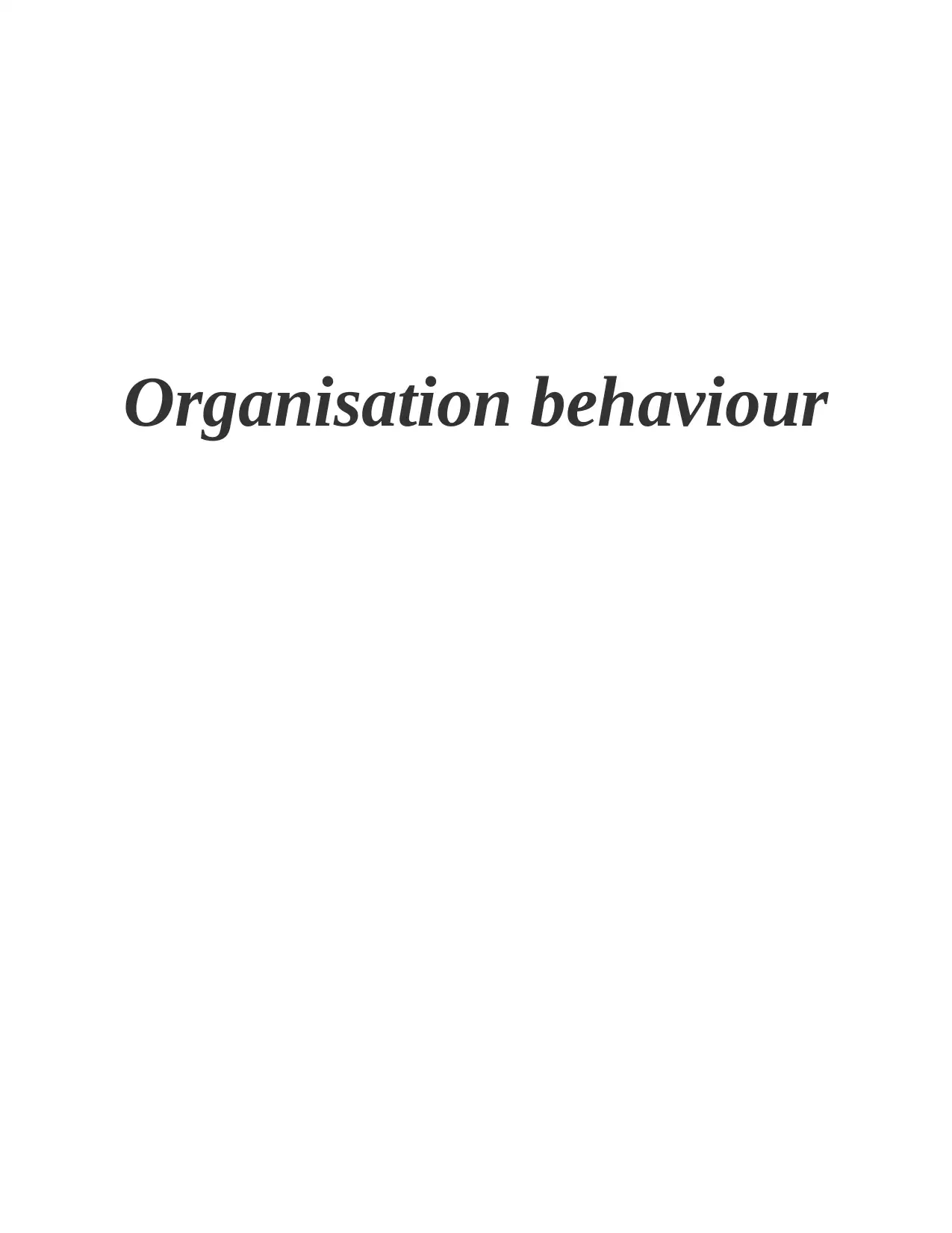
Organisation behaviour
Paraphrase This Document
Need a fresh take? Get an instant paraphrase of this document with our AI Paraphraser
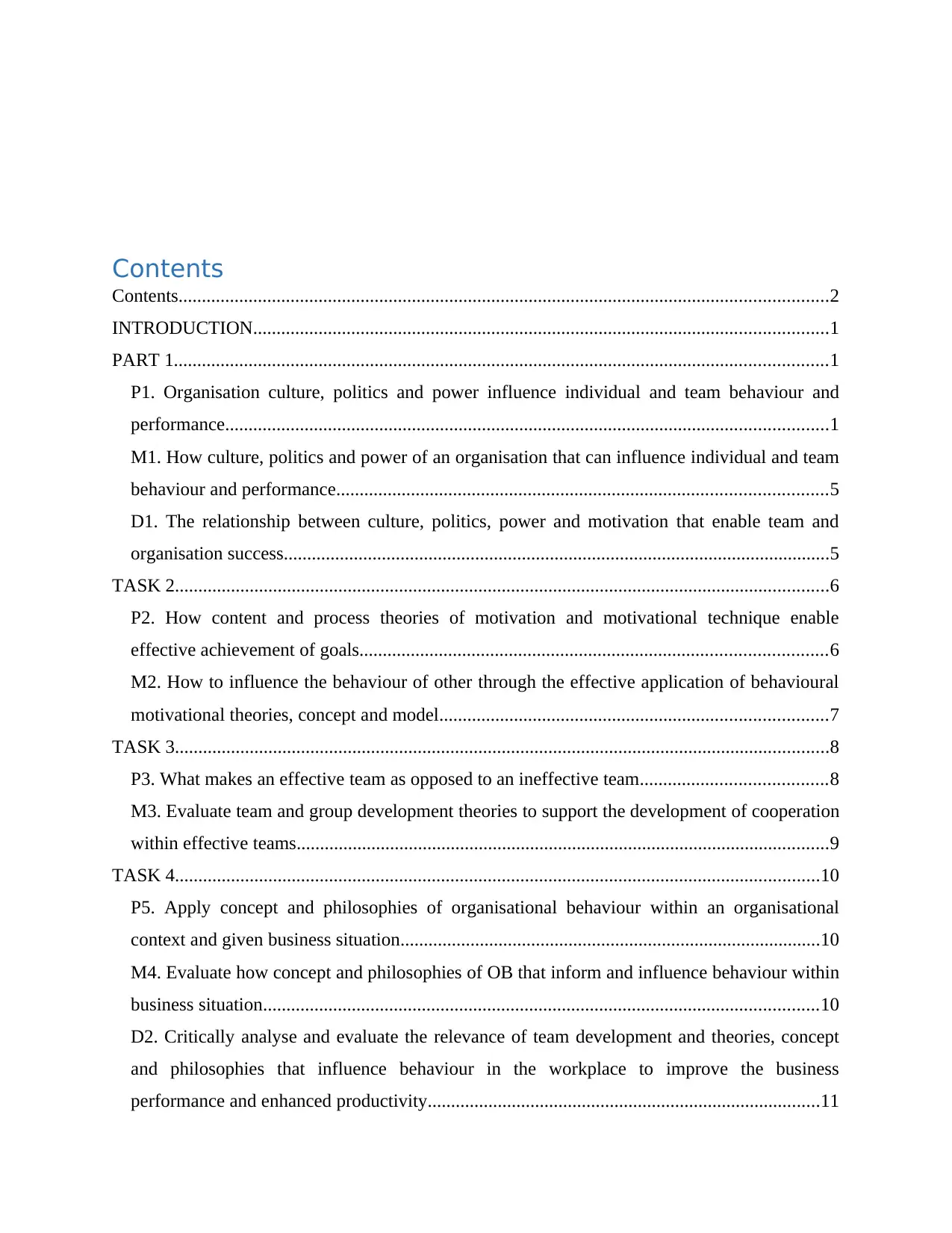
Contents
Contents...........................................................................................................................................2
INTRODUCTION...........................................................................................................................1
PART 1............................................................................................................................................1
P1. Organisation culture, politics and power influence individual and team behaviour and
performance.................................................................................................................................1
M1. How culture, politics and power of an organisation that can influence individual and team
behaviour and performance.........................................................................................................5
D1. The relationship between culture, politics, power and motivation that enable team and
organisation success.....................................................................................................................5
TASK 2............................................................................................................................................6
P2. How content and process theories of motivation and motivational technique enable
effective achievement of goals....................................................................................................6
M2. How to influence the behaviour of other through the effective application of behavioural
motivational theories, concept and model...................................................................................7
TASK 3............................................................................................................................................8
P3. What makes an effective team as opposed to an ineffective team........................................8
M3. Evaluate team and group development theories to support the development of cooperation
within effective teams..................................................................................................................9
TASK 4..........................................................................................................................................10
P5. Apply concept and philosophies of organisational behaviour within an organisational
context and given business situation..........................................................................................10
M4. Evaluate how concept and philosophies of OB that inform and influence behaviour within
business situation.......................................................................................................................10
D2. Critically analyse and evaluate the relevance of team development and theories, concept
and philosophies that influence behaviour in the workplace to improve the business
performance and enhanced productivity....................................................................................11
Contents...........................................................................................................................................2
INTRODUCTION...........................................................................................................................1
PART 1............................................................................................................................................1
P1. Organisation culture, politics and power influence individual and team behaviour and
performance.................................................................................................................................1
M1. How culture, politics and power of an organisation that can influence individual and team
behaviour and performance.........................................................................................................5
D1. The relationship between culture, politics, power and motivation that enable team and
organisation success.....................................................................................................................5
TASK 2............................................................................................................................................6
P2. How content and process theories of motivation and motivational technique enable
effective achievement of goals....................................................................................................6
M2. How to influence the behaviour of other through the effective application of behavioural
motivational theories, concept and model...................................................................................7
TASK 3............................................................................................................................................8
P3. What makes an effective team as opposed to an ineffective team........................................8
M3. Evaluate team and group development theories to support the development of cooperation
within effective teams..................................................................................................................9
TASK 4..........................................................................................................................................10
P5. Apply concept and philosophies of organisational behaviour within an organisational
context and given business situation..........................................................................................10
M4. Evaluate how concept and philosophies of OB that inform and influence behaviour within
business situation.......................................................................................................................10
D2. Critically analyse and evaluate the relevance of team development and theories, concept
and philosophies that influence behaviour in the workplace to improve the business
performance and enhanced productivity....................................................................................11
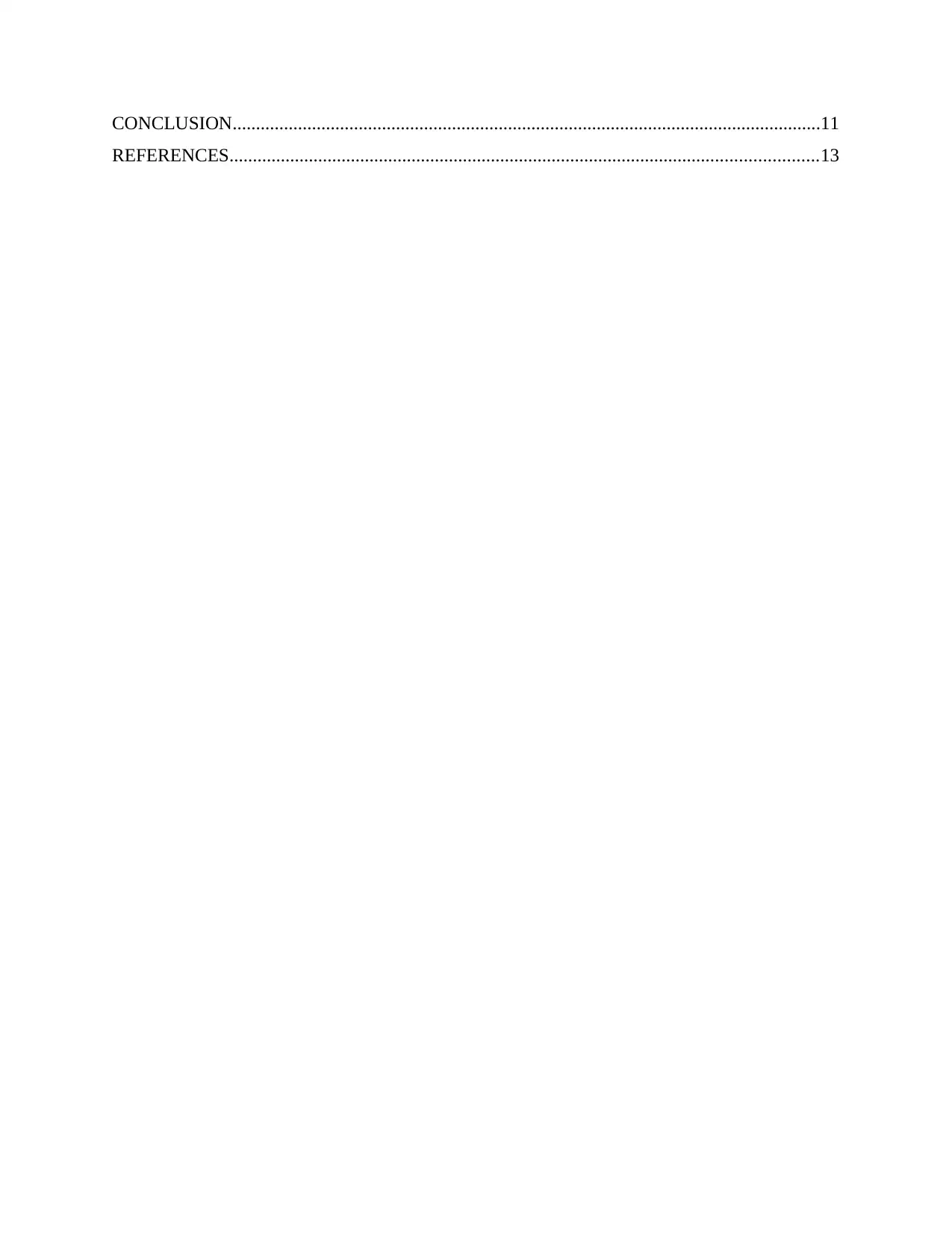
CONCLUSION..............................................................................................................................11
REFERENCES..............................................................................................................................13
REFERENCES..............................................................................................................................13
⊘ This is a preview!⊘
Do you want full access?
Subscribe today to unlock all pages.

Trusted by 1+ million students worldwide
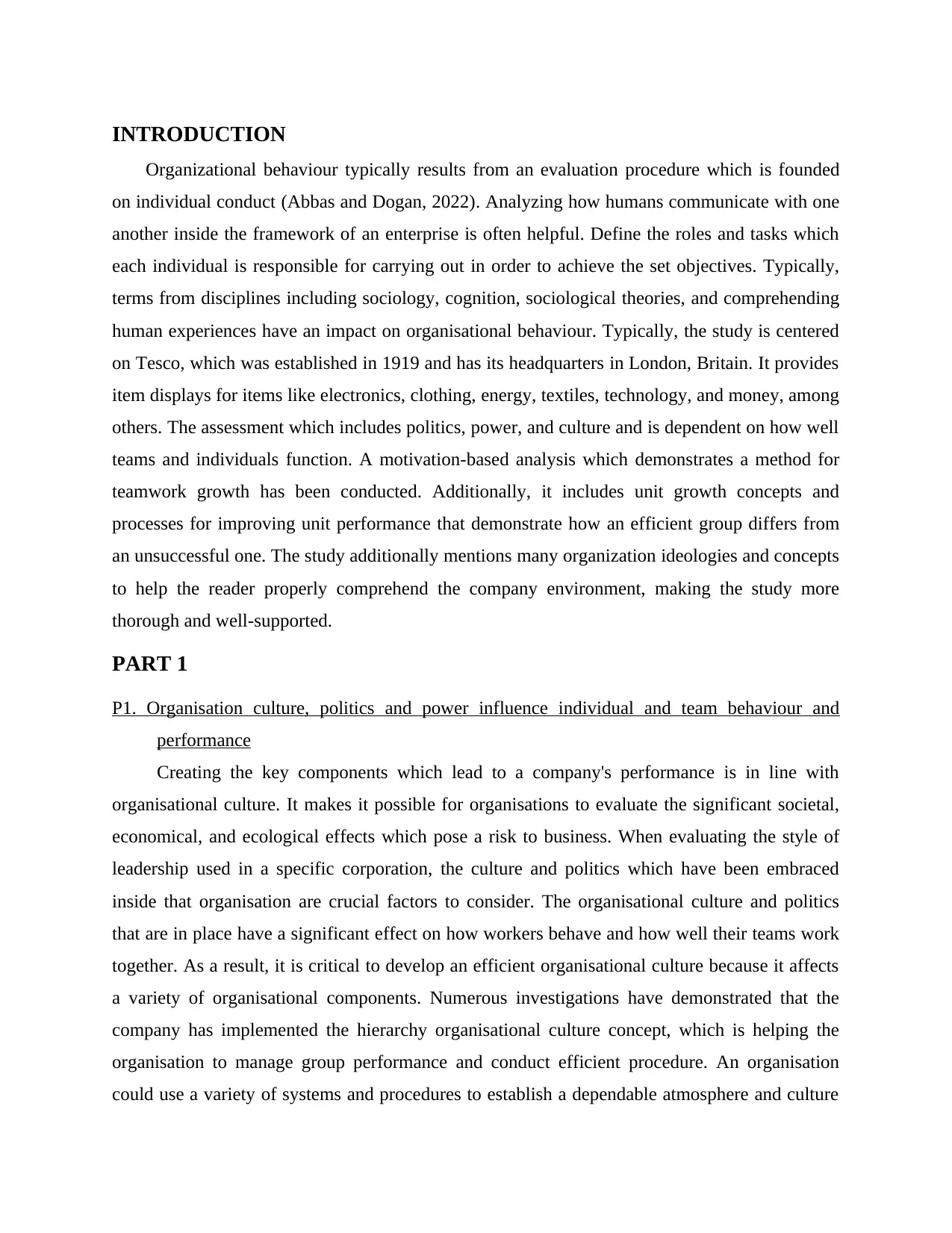
INTRODUCTION
Organizational behaviour typically results from an evaluation procedure which is founded
on individual conduct (Abbas and Dogan, 2022). Analyzing how humans communicate with one
another inside the framework of an enterprise is often helpful. Define the roles and tasks which
each individual is responsible for carrying out in order to achieve the set objectives. Typically,
terms from disciplines including sociology, cognition, sociological theories, and comprehending
human experiences have an impact on organisational behaviour. Typically, the study is centered
on Tesco, which was established in 1919 and has its headquarters in London, Britain. It provides
item displays for items like electronics, clothing, energy, textiles, technology, and money, among
others. The assessment which includes politics, power, and culture and is dependent on how well
teams and individuals function. A motivation-based analysis which demonstrates a method for
teamwork growth has been conducted. Additionally, it includes unit growth concepts and
processes for improving unit performance that demonstrate how an efficient group differs from
an unsuccessful one. The study additionally mentions many organization ideologies and concepts
to help the reader properly comprehend the company environment, making the study more
thorough and well-supported.
PART 1
P1. Organisation culture, politics and power influence individual and team behaviour and
performance
Creating the key components which lead to a company's performance is in line with
organisational culture. It makes it possible for organisations to evaluate the significant societal,
economical, and ecological effects which pose a risk to business. When evaluating the style of
leadership used in a specific corporation, the culture and politics which have been embraced
inside that organisation are crucial factors to consider. The organisational culture and politics
that are in place have a significant effect on how workers behave and how well their teams work
together. As a result, it is critical to develop an efficient organisational culture because it affects
a variety of organisational components. Numerous investigations have demonstrated that the
company has implemented the hierarchy organisational culture concept, which is helping the
organisation to manage group performance and conduct efficient procedure. An organisation
could use a variety of systems and procedures to establish a dependable atmosphere and culture
Organizational behaviour typically results from an evaluation procedure which is founded
on individual conduct (Abbas and Dogan, 2022). Analyzing how humans communicate with one
another inside the framework of an enterprise is often helpful. Define the roles and tasks which
each individual is responsible for carrying out in order to achieve the set objectives. Typically,
terms from disciplines including sociology, cognition, sociological theories, and comprehending
human experiences have an impact on organisational behaviour. Typically, the study is centered
on Tesco, which was established in 1919 and has its headquarters in London, Britain. It provides
item displays for items like electronics, clothing, energy, textiles, technology, and money, among
others. The assessment which includes politics, power, and culture and is dependent on how well
teams and individuals function. A motivation-based analysis which demonstrates a method for
teamwork growth has been conducted. Additionally, it includes unit growth concepts and
processes for improving unit performance that demonstrate how an efficient group differs from
an unsuccessful one. The study additionally mentions many organization ideologies and concepts
to help the reader properly comprehend the company environment, making the study more
thorough and well-supported.
PART 1
P1. Organisation culture, politics and power influence individual and team behaviour and
performance
Creating the key components which lead to a company's performance is in line with
organisational culture. It makes it possible for organisations to evaluate the significant societal,
economical, and ecological effects which pose a risk to business. When evaluating the style of
leadership used in a specific corporation, the culture and politics which have been embraced
inside that organisation are crucial factors to consider. The organisational culture and politics
that are in place have a significant effect on how workers behave and how well their teams work
together. As a result, it is critical to develop an efficient organisational culture because it affects
a variety of organisational components. Numerous investigations have demonstrated that the
company has implemented the hierarchy organisational culture concept, which is helping the
organisation to manage group performance and conduct efficient procedure. An organisation
could use a variety of systems and procedures to establish a dependable atmosphere and culture
Paraphrase This Document
Need a fresh take? Get an instant paraphrase of this document with our AI Paraphraser
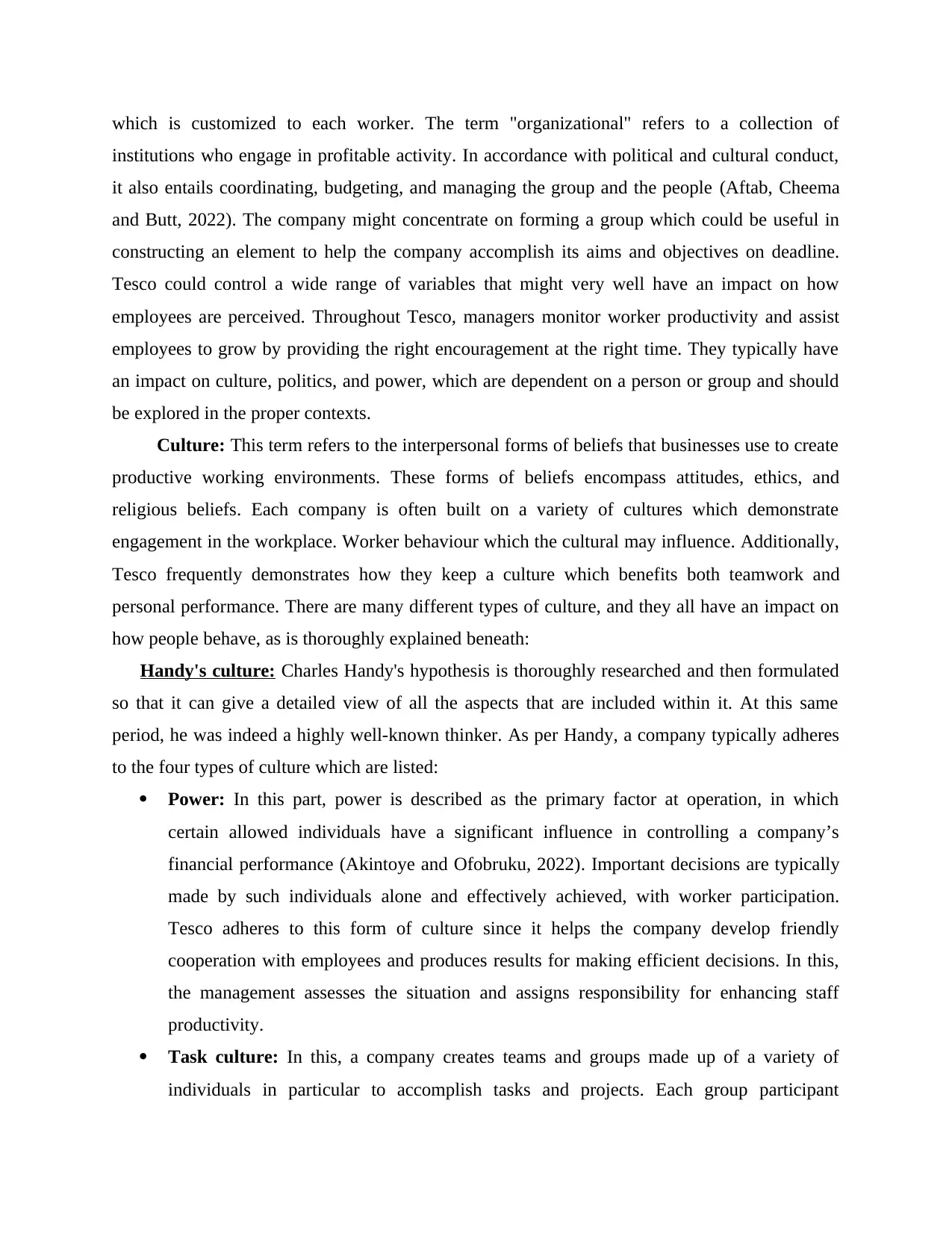
which is customized to each worker. The term "organizational" refers to a collection of
institutions who engage in profitable activity. In accordance with political and cultural conduct,
it also entails coordinating, budgeting, and managing the group and the people (Aftab, Cheema
and Butt, 2022). The company might concentrate on forming a group which could be useful in
constructing an element to help the company accomplish its aims and objectives on deadline.
Tesco could control a wide range of variables that might very well have an impact on how
employees are perceived. Throughout Tesco, managers monitor worker productivity and assist
employees to grow by providing the right encouragement at the right time. They typically have
an impact on culture, politics, and power, which are dependent on a person or group and should
be explored in the proper contexts.
Culture: This term refers to the interpersonal forms of beliefs that businesses use to create
productive working environments. These forms of beliefs encompass attitudes, ethics, and
religious beliefs. Each company is often built on a variety of cultures which demonstrate
engagement in the workplace. Worker behaviour which the cultural may influence. Additionally,
Tesco frequently demonstrates how they keep a culture which benefits both teamwork and
personal performance. There are many different types of culture, and they all have an impact on
how people behave, as is thoroughly explained beneath:
Handy's culture: Charles Handy's hypothesis is thoroughly researched and then formulated
so that it can give a detailed view of all the aspects that are included within it. At this same
period, he was indeed a highly well-known thinker. As per Handy, a company typically adheres
to the four types of culture which are listed:
Power: In this part, power is described as the primary factor at operation, in which
certain allowed individuals have a significant influence in controlling a company’s
financial performance (Akintoye and Ofobruku, 2022). Important decisions are typically
made by such individuals alone and effectively achieved, with worker participation.
Tesco adheres to this form of culture since it helps the company develop friendly
cooperation with employees and produces results for making efficient decisions. In this,
the management assesses the situation and assigns responsibility for enhancing staff
productivity.
Task culture: In this, a company creates teams and groups made up of a variety of
individuals in particular to accomplish tasks and projects. Each group participant
institutions who engage in profitable activity. In accordance with political and cultural conduct,
it also entails coordinating, budgeting, and managing the group and the people (Aftab, Cheema
and Butt, 2022). The company might concentrate on forming a group which could be useful in
constructing an element to help the company accomplish its aims and objectives on deadline.
Tesco could control a wide range of variables that might very well have an impact on how
employees are perceived. Throughout Tesco, managers monitor worker productivity and assist
employees to grow by providing the right encouragement at the right time. They typically have
an impact on culture, politics, and power, which are dependent on a person or group and should
be explored in the proper contexts.
Culture: This term refers to the interpersonal forms of beliefs that businesses use to create
productive working environments. These forms of beliefs encompass attitudes, ethics, and
religious beliefs. Each company is often built on a variety of cultures which demonstrate
engagement in the workplace. Worker behaviour which the cultural may influence. Additionally,
Tesco frequently demonstrates how they keep a culture which benefits both teamwork and
personal performance. There are many different types of culture, and they all have an impact on
how people behave, as is thoroughly explained beneath:
Handy's culture: Charles Handy's hypothesis is thoroughly researched and then formulated
so that it can give a detailed view of all the aspects that are included within it. At this same
period, he was indeed a highly well-known thinker. As per Handy, a company typically adheres
to the four types of culture which are listed:
Power: In this part, power is described as the primary factor at operation, in which
certain allowed individuals have a significant influence in controlling a company’s
financial performance (Akintoye and Ofobruku, 2022). Important decisions are typically
made by such individuals alone and effectively achieved, with worker participation.
Tesco adheres to this form of culture since it helps the company develop friendly
cooperation with employees and produces results for making efficient decisions. In this,
the management assesses the situation and assigns responsibility for enhancing staff
productivity.
Task culture: In this, a company creates teams and groups made up of a variety of
individuals in particular to accomplish tasks and projects. Each group participant
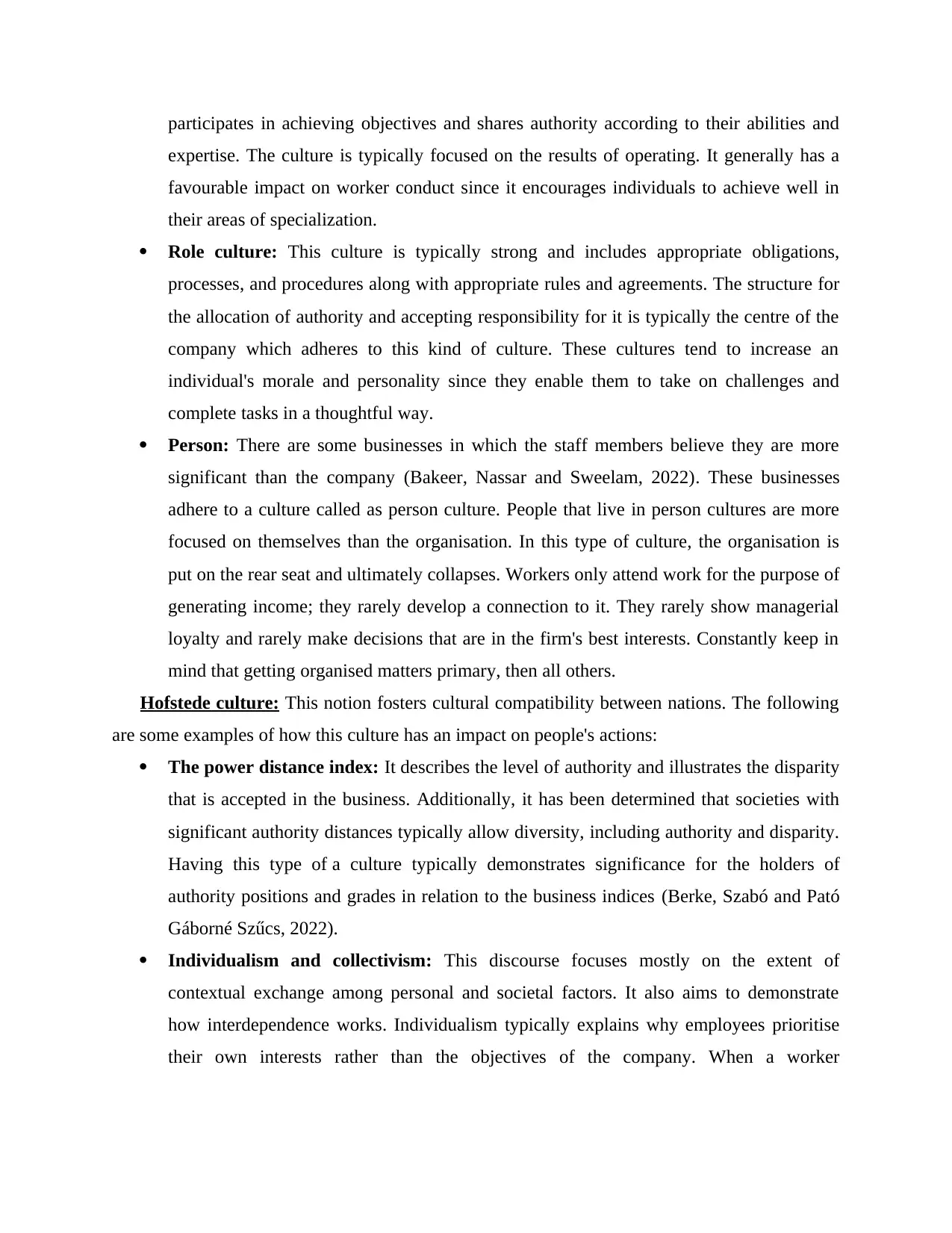
participates in achieving objectives and shares authority according to their abilities and
expertise. The culture is typically focused on the results of operating. It generally has a
favourable impact on worker conduct since it encourages individuals to achieve well in
their areas of specialization.
Role culture: This culture is typically strong and includes appropriate obligations,
processes, and procedures along with appropriate rules and agreements. The structure for
the allocation of authority and accepting responsibility for it is typically the centre of the
company which adheres to this kind of culture. These cultures tend to increase an
individual's morale and personality since they enable them to take on challenges and
complete tasks in a thoughtful way.
Person: There are some businesses in which the staff members believe they are more
significant than the company (Bakeer, Nassar and Sweelam, 2022). These businesses
adhere to a culture called as person culture. People that live in person cultures are more
focused on themselves than the organisation. In this type of culture, the organisation is
put on the rear seat and ultimately collapses. Workers only attend work for the purpose of
generating income; they rarely develop a connection to it. They rarely show managerial
loyalty and rarely make decisions that are in the firm's best interests. Constantly keep in
mind that getting organised matters primary, then all others.
Hofstede culture: This notion fosters cultural compatibility between nations. The following
are some examples of how this culture has an impact on people's actions:
The power distance index: It describes the level of authority and illustrates the disparity
that is accepted in the business. Additionally, it has been determined that societies with
significant authority distances typically allow diversity, including authority and disparity.
Having this type of a culture typically demonstrates significance for the holders of
authority positions and grades in relation to the business indices (Berke, Szabó and Pató
Gáborné Szűcs, 2022).
Individualism and collectivism: This discourse focuses mostly on the extent of
contextual exchange among personal and societal factors. It also aims to demonstrate
how interdependence works. Individualism typically explains why employees prioritise
their own interests rather than the objectives of the company. When a worker
expertise. The culture is typically focused on the results of operating. It generally has a
favourable impact on worker conduct since it encourages individuals to achieve well in
their areas of specialization.
Role culture: This culture is typically strong and includes appropriate obligations,
processes, and procedures along with appropriate rules and agreements. The structure for
the allocation of authority and accepting responsibility for it is typically the centre of the
company which adheres to this kind of culture. These cultures tend to increase an
individual's morale and personality since they enable them to take on challenges and
complete tasks in a thoughtful way.
Person: There are some businesses in which the staff members believe they are more
significant than the company (Bakeer, Nassar and Sweelam, 2022). These businesses
adhere to a culture called as person culture. People that live in person cultures are more
focused on themselves than the organisation. In this type of culture, the organisation is
put on the rear seat and ultimately collapses. Workers only attend work for the purpose of
generating income; they rarely develop a connection to it. They rarely show managerial
loyalty and rarely make decisions that are in the firm's best interests. Constantly keep in
mind that getting organised matters primary, then all others.
Hofstede culture: This notion fosters cultural compatibility between nations. The following
are some examples of how this culture has an impact on people's actions:
The power distance index: It describes the level of authority and illustrates the disparity
that is accepted in the business. Additionally, it has been determined that societies with
significant authority distances typically allow diversity, including authority and disparity.
Having this type of a culture typically demonstrates significance for the holders of
authority positions and grades in relation to the business indices (Berke, Szabó and Pató
Gáborné Szűcs, 2022).
Individualism and collectivism: This discourse focuses mostly on the extent of
contextual exchange among personal and societal factors. It also aims to demonstrate
how interdependence works. Individualism typically explains why employees prioritise
their own interests rather than the objectives of the company. When a worker
⊘ This is a preview!⊘
Do you want full access?
Subscribe today to unlock all pages.

Trusted by 1+ million students worldwide
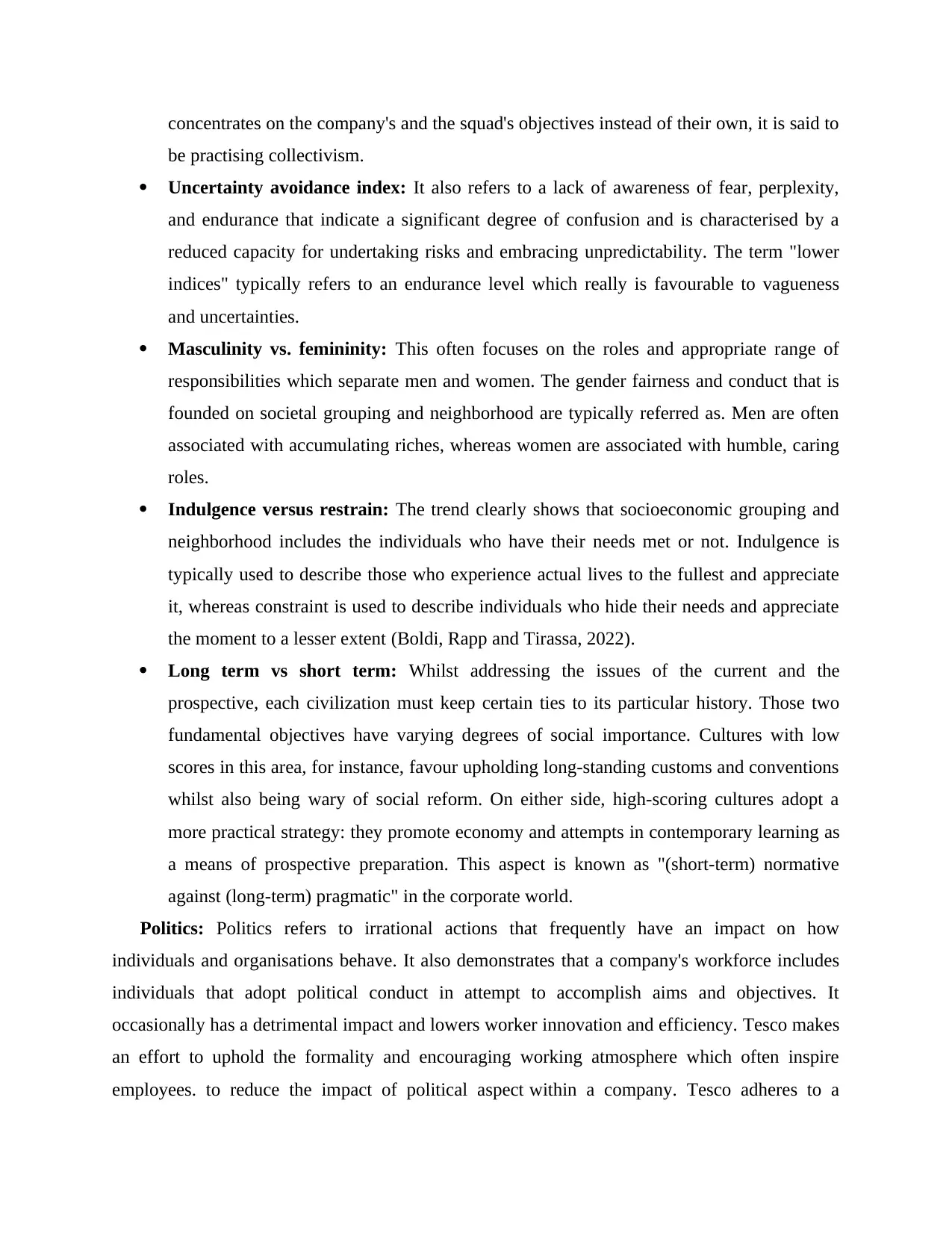
concentrates on the company's and the squad's objectives instead of their own, it is said to
be practising collectivism.
Uncertainty avoidance index: It also refers to a lack of awareness of fear, perplexity,
and endurance that indicate a significant degree of confusion and is characterised by a
reduced capacity for undertaking risks and embracing unpredictability. The term "lower
indices" typically refers to an endurance level which really is favourable to vagueness
and uncertainties.
Masculinity vs. femininity: This often focuses on the roles and appropriate range of
responsibilities which separate men and women. The gender fairness and conduct that is
founded on societal grouping and neighborhood are typically referred as. Men are often
associated with accumulating riches, whereas women are associated with humble, caring
roles.
Indulgence versus restrain: The trend clearly shows that socioeconomic grouping and
neighborhood includes the individuals who have their needs met or not. Indulgence is
typically used to describe those who experience actual lives to the fullest and appreciate
it, whereas constraint is used to describe individuals who hide their needs and appreciate
the moment to a lesser extent (Boldi, Rapp and Tirassa, 2022).
Long term vs short term: Whilst addressing the issues of the current and the
prospective, each civilization must keep certain ties to its particular history. Those two
fundamental objectives have varying degrees of social importance. Cultures with low
scores in this area, for instance, favour upholding long-standing customs and conventions
whilst also being wary of social reform. On either side, high-scoring cultures adopt a
more practical strategy: they promote economy and attempts in contemporary learning as
a means of prospective preparation. This aspect is known as "(short-term) normative
against (long-term) pragmatic" in the corporate world.
Politics: Politics refers to irrational actions that frequently have an impact on how
individuals and organisations behave. It also demonstrates that a company's workforce includes
individuals that adopt political conduct in attempt to accomplish aims and objectives. It
occasionally has a detrimental impact and lowers worker innovation and efficiency. Tesco makes
an effort to uphold the formality and encouraging working atmosphere which often inspire
employees. to reduce the impact of political aspect within a company. Tesco adheres to a
be practising collectivism.
Uncertainty avoidance index: It also refers to a lack of awareness of fear, perplexity,
and endurance that indicate a significant degree of confusion and is characterised by a
reduced capacity for undertaking risks and embracing unpredictability. The term "lower
indices" typically refers to an endurance level which really is favourable to vagueness
and uncertainties.
Masculinity vs. femininity: This often focuses on the roles and appropriate range of
responsibilities which separate men and women. The gender fairness and conduct that is
founded on societal grouping and neighborhood are typically referred as. Men are often
associated with accumulating riches, whereas women are associated with humble, caring
roles.
Indulgence versus restrain: The trend clearly shows that socioeconomic grouping and
neighborhood includes the individuals who have their needs met or not. Indulgence is
typically used to describe those who experience actual lives to the fullest and appreciate
it, whereas constraint is used to describe individuals who hide their needs and appreciate
the moment to a lesser extent (Boldi, Rapp and Tirassa, 2022).
Long term vs short term: Whilst addressing the issues of the current and the
prospective, each civilization must keep certain ties to its particular history. Those two
fundamental objectives have varying degrees of social importance. Cultures with low
scores in this area, for instance, favour upholding long-standing customs and conventions
whilst also being wary of social reform. On either side, high-scoring cultures adopt a
more practical strategy: they promote economy and attempts in contemporary learning as
a means of prospective preparation. This aspect is known as "(short-term) normative
against (long-term) pragmatic" in the corporate world.
Politics: Politics refers to irrational actions that frequently have an impact on how
individuals and organisations behave. It also demonstrates that a company's workforce includes
individuals that adopt political conduct in attempt to accomplish aims and objectives. It
occasionally has a detrimental impact and lowers worker innovation and efficiency. Tesco makes
an effort to uphold the formality and encouraging working atmosphere which often inspire
employees. to reduce the impact of political aspect within a company. Tesco adheres to a
Paraphrase This Document
Need a fresh take? Get an instant paraphrase of this document with our AI Paraphraser
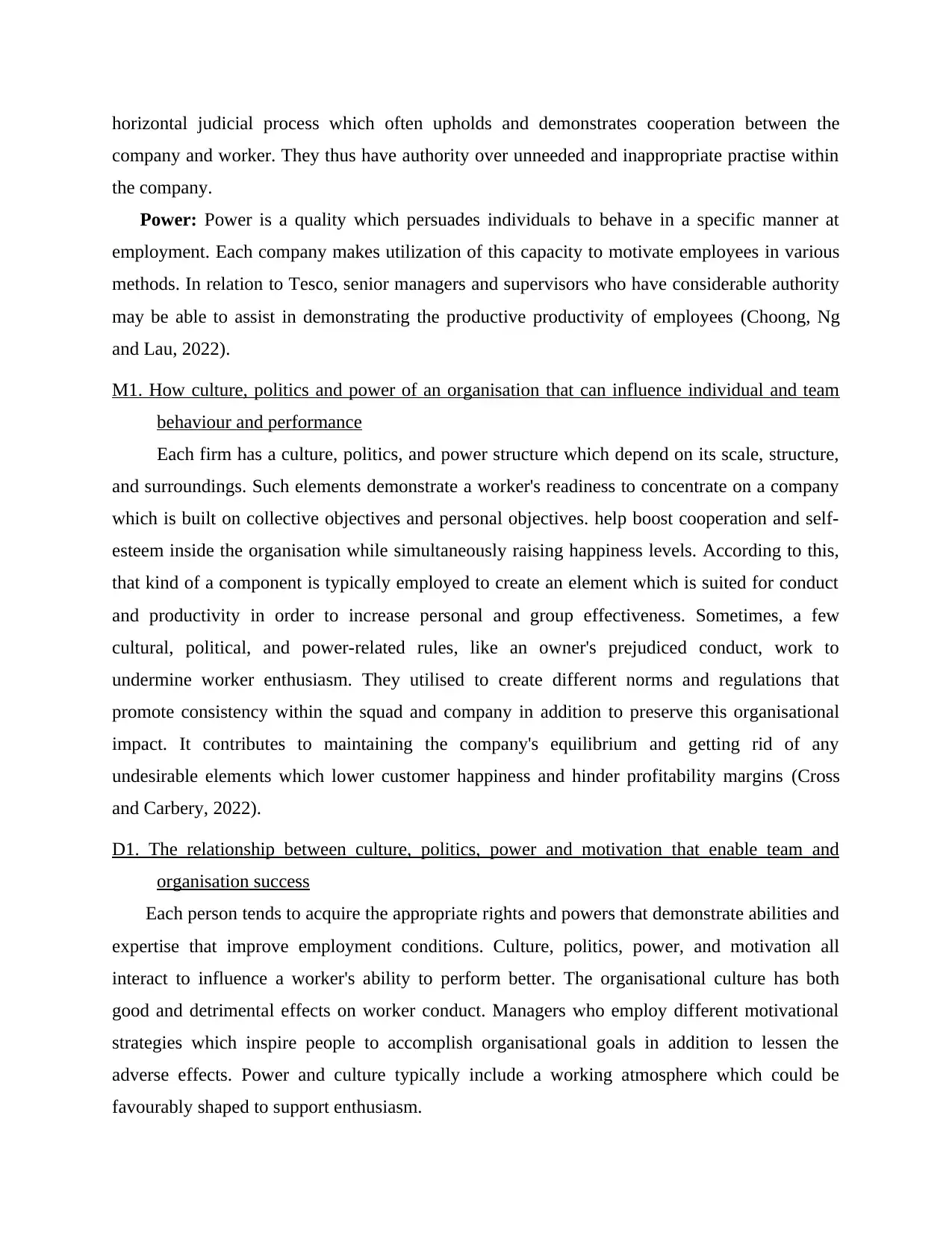
horizontal judicial process which often upholds and demonstrates cooperation between the
company and worker. They thus have authority over unneeded and inappropriate practise within
the company.
Power: Power is a quality which persuades individuals to behave in a specific manner at
employment. Each company makes utilization of this capacity to motivate employees in various
methods. In relation to Tesco, senior managers and supervisors who have considerable authority
may be able to assist in demonstrating the productive productivity of employees (Choong, Ng
and Lau, 2022).
M1. How culture, politics and power of an organisation that can influence individual and team
behaviour and performance
Each firm has a culture, politics, and power structure which depend on its scale, structure,
and surroundings. Such elements demonstrate a worker's readiness to concentrate on a company
which is built on collective objectives and personal objectives. help boost cooperation and self-
esteem inside the organisation while simultaneously raising happiness levels. According to this,
that kind of a component is typically employed to create an element which is suited for conduct
and productivity in order to increase personal and group effectiveness. Sometimes, a few
cultural, political, and power-related rules, like an owner's prejudiced conduct, work to
undermine worker enthusiasm. They utilised to create different norms and regulations that
promote consistency within the squad and company in addition to preserve this organisational
impact. It contributes to maintaining the company's equilibrium and getting rid of any
undesirable elements which lower customer happiness and hinder profitability margins (Cross
and Carbery, 2022).
D1. The relationship between culture, politics, power and motivation that enable team and
organisation success
Each person tends to acquire the appropriate rights and powers that demonstrate abilities and
expertise that improve employment conditions. Culture, politics, power, and motivation all
interact to influence a worker's ability to perform better. The organisational culture has both
good and detrimental effects on worker conduct. Managers who employ different motivational
strategies which inspire people to accomplish organisational goals in addition to lessen the
adverse effects. Power and culture typically include a working atmosphere which could be
favourably shaped to support enthusiasm.
company and worker. They thus have authority over unneeded and inappropriate practise within
the company.
Power: Power is a quality which persuades individuals to behave in a specific manner at
employment. Each company makes utilization of this capacity to motivate employees in various
methods. In relation to Tesco, senior managers and supervisors who have considerable authority
may be able to assist in demonstrating the productive productivity of employees (Choong, Ng
and Lau, 2022).
M1. How culture, politics and power of an organisation that can influence individual and team
behaviour and performance
Each firm has a culture, politics, and power structure which depend on its scale, structure,
and surroundings. Such elements demonstrate a worker's readiness to concentrate on a company
which is built on collective objectives and personal objectives. help boost cooperation and self-
esteem inside the organisation while simultaneously raising happiness levels. According to this,
that kind of a component is typically employed to create an element which is suited for conduct
and productivity in order to increase personal and group effectiveness. Sometimes, a few
cultural, political, and power-related rules, like an owner's prejudiced conduct, work to
undermine worker enthusiasm. They utilised to create different norms and regulations that
promote consistency within the squad and company in addition to preserve this organisational
impact. It contributes to maintaining the company's equilibrium and getting rid of any
undesirable elements which lower customer happiness and hinder profitability margins (Cross
and Carbery, 2022).
D1. The relationship between culture, politics, power and motivation that enable team and
organisation success
Each person tends to acquire the appropriate rights and powers that demonstrate abilities and
expertise that improve employment conditions. Culture, politics, power, and motivation all
interact to influence a worker's ability to perform better. The organisational culture has both
good and detrimental effects on worker conduct. Managers who employ different motivational
strategies which inspire people to accomplish organisational goals in addition to lessen the
adverse effects. Power and culture typically include a working atmosphere which could be
favourably shaped to support enthusiasm.
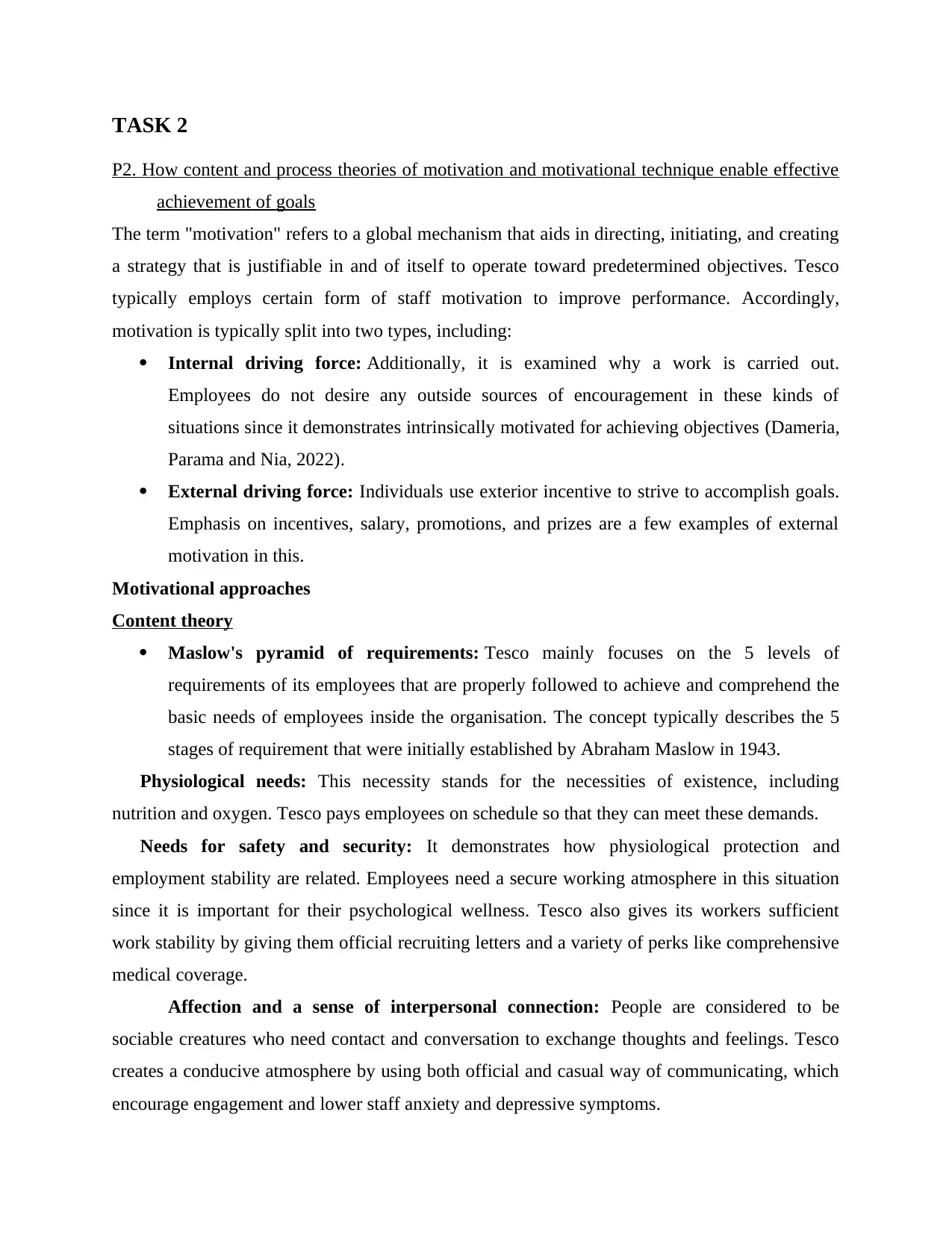
TASK 2
P2. How content and process theories of motivation and motivational technique enable effective
achievement of goals
The term "motivation" refers to a global mechanism that aids in directing, initiating, and creating
a strategy that is justifiable in and of itself to operate toward predetermined objectives. Tesco
typically employs certain form of staff motivation to improve performance. Accordingly,
motivation is typically split into two types, including:
Internal driving force: Additionally, it is examined why a work is carried out.
Employees do not desire any outside sources of encouragement in these kinds of
situations since it demonstrates intrinsically motivated for achieving objectives (Dameria,
Parama and Nia, 2022).
External driving force: Individuals use exterior incentive to strive to accomplish goals.
Emphasis on incentives, salary, promotions, and prizes are a few examples of external
motivation in this.
Motivational approaches
Content theory
Maslow's pyramid of requirements: Tesco mainly focuses on the 5 levels of
requirements of its employees that are properly followed to achieve and comprehend the
basic needs of employees inside the organisation. The concept typically describes the 5
stages of requirement that were initially established by Abraham Maslow in 1943.
Physiological needs: This necessity stands for the necessities of existence, including
nutrition and oxygen. Tesco pays employees on schedule so that they can meet these demands.
Needs for safety and security: It demonstrates how physiological protection and
employment stability are related. Employees need a secure working atmosphere in this situation
since it is important for their psychological wellness. Tesco also gives its workers sufficient
work stability by giving them official recruiting letters and a variety of perks like comprehensive
medical coverage.
Affection and a sense of interpersonal connection: People are considered to be
sociable creatures who need contact and conversation to exchange thoughts and feelings. Tesco
creates a conducive atmosphere by using both official and casual way of communicating, which
encourage engagement and lower staff anxiety and depressive symptoms.
P2. How content and process theories of motivation and motivational technique enable effective
achievement of goals
The term "motivation" refers to a global mechanism that aids in directing, initiating, and creating
a strategy that is justifiable in and of itself to operate toward predetermined objectives. Tesco
typically employs certain form of staff motivation to improve performance. Accordingly,
motivation is typically split into two types, including:
Internal driving force: Additionally, it is examined why a work is carried out.
Employees do not desire any outside sources of encouragement in these kinds of
situations since it demonstrates intrinsically motivated for achieving objectives (Dameria,
Parama and Nia, 2022).
External driving force: Individuals use exterior incentive to strive to accomplish goals.
Emphasis on incentives, salary, promotions, and prizes are a few examples of external
motivation in this.
Motivational approaches
Content theory
Maslow's pyramid of requirements: Tesco mainly focuses on the 5 levels of
requirements of its employees that are properly followed to achieve and comprehend the
basic needs of employees inside the organisation. The concept typically describes the 5
stages of requirement that were initially established by Abraham Maslow in 1943.
Physiological needs: This necessity stands for the necessities of existence, including
nutrition and oxygen. Tesco pays employees on schedule so that they can meet these demands.
Needs for safety and security: It demonstrates how physiological protection and
employment stability are related. Employees need a secure working atmosphere in this situation
since it is important for their psychological wellness. Tesco also gives its workers sufficient
work stability by giving them official recruiting letters and a variety of perks like comprehensive
medical coverage.
Affection and a sense of interpersonal connection: People are considered to be
sociable creatures who need contact and conversation to exchange thoughts and feelings. Tesco
creates a conducive atmosphere by using both official and casual way of communicating, which
encourage engagement and lower staff anxiety and depressive symptoms.
⊘ This is a preview!⊘
Do you want full access?
Subscribe today to unlock all pages.

Trusted by 1+ million students worldwide
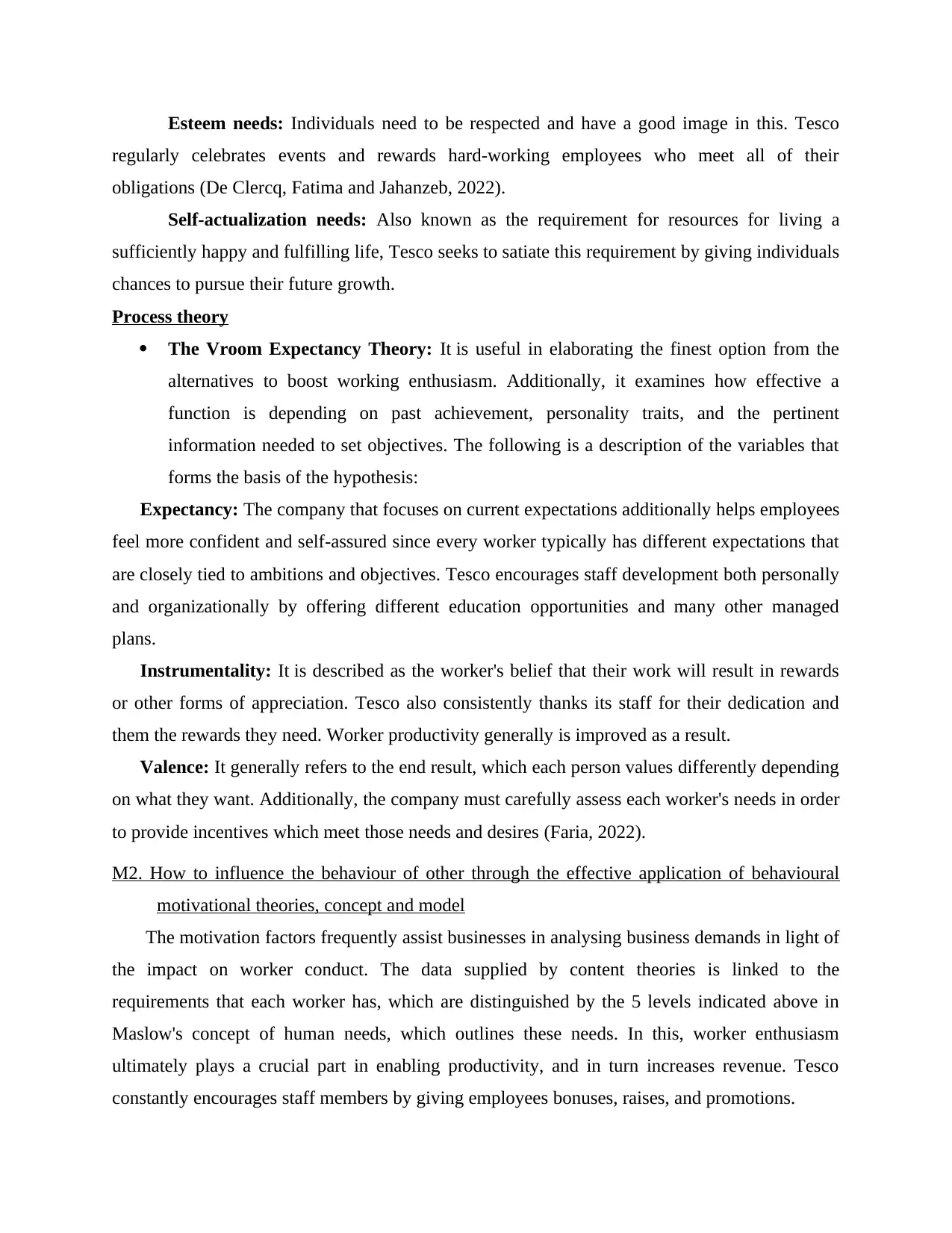
Esteem needs: Individuals need to be respected and have a good image in this. Tesco
regularly celebrates events and rewards hard-working employees who meet all of their
obligations (De Clercq, Fatima and Jahanzeb, 2022).
Self-actualization needs: Also known as the requirement for resources for living a
sufficiently happy and fulfilling life, Tesco seeks to satiate this requirement by giving individuals
chances to pursue their future growth.
Process theory
The Vroom Expectancy Theory: It is useful in elaborating the finest option from the
alternatives to boost working enthusiasm. Additionally, it examines how effective a
function is depending on past achievement, personality traits, and the pertinent
information needed to set objectives. The following is a description of the variables that
forms the basis of the hypothesis:
Expectancy: The company that focuses on current expectations additionally helps employees
feel more confident and self-assured since every worker typically has different expectations that
are closely tied to ambitions and objectives. Tesco encourages staff development both personally
and organizationally by offering different education opportunities and many other managed
plans.
Instrumentality: It is described as the worker's belief that their work will result in rewards
or other forms of appreciation. Tesco also consistently thanks its staff for their dedication and
them the rewards they need. Worker productivity generally is improved as a result.
Valence: It generally refers to the end result, which each person values differently depending
on what they want. Additionally, the company must carefully assess each worker's needs in order
to provide incentives which meet those needs and desires (Faria, 2022).
M2. How to influence the behaviour of other through the effective application of behavioural
motivational theories, concept and model
The motivation factors frequently assist businesses in analysing business demands in light of
the impact on worker conduct. The data supplied by content theories is linked to the
requirements that each worker has, which are distinguished by the 5 levels indicated above in
Maslow's concept of human needs, which outlines these needs. In this, worker enthusiasm
ultimately plays a crucial part in enabling productivity, and in turn increases revenue. Tesco
constantly encourages staff members by giving employees bonuses, raises, and promotions.
regularly celebrates events and rewards hard-working employees who meet all of their
obligations (De Clercq, Fatima and Jahanzeb, 2022).
Self-actualization needs: Also known as the requirement for resources for living a
sufficiently happy and fulfilling life, Tesco seeks to satiate this requirement by giving individuals
chances to pursue their future growth.
Process theory
The Vroom Expectancy Theory: It is useful in elaborating the finest option from the
alternatives to boost working enthusiasm. Additionally, it examines how effective a
function is depending on past achievement, personality traits, and the pertinent
information needed to set objectives. The following is a description of the variables that
forms the basis of the hypothesis:
Expectancy: The company that focuses on current expectations additionally helps employees
feel more confident and self-assured since every worker typically has different expectations that
are closely tied to ambitions and objectives. Tesco encourages staff development both personally
and organizationally by offering different education opportunities and many other managed
plans.
Instrumentality: It is described as the worker's belief that their work will result in rewards
or other forms of appreciation. Tesco also consistently thanks its staff for their dedication and
them the rewards they need. Worker productivity generally is improved as a result.
Valence: It generally refers to the end result, which each person values differently depending
on what they want. Additionally, the company must carefully assess each worker's needs in order
to provide incentives which meet those needs and desires (Faria, 2022).
M2. How to influence the behaviour of other through the effective application of behavioural
motivational theories, concept and model
The motivation factors frequently assist businesses in analysing business demands in light of
the impact on worker conduct. The data supplied by content theories is linked to the
requirements that each worker has, which are distinguished by the 5 levels indicated above in
Maslow's concept of human needs, which outlines these needs. In this, worker enthusiasm
ultimately plays a crucial part in enabling productivity, and in turn increases revenue. Tesco
constantly encourages staff members by giving employees bonuses, raises, and promotions.
Paraphrase This Document
Need a fresh take? Get an instant paraphrase of this document with our AI Paraphraser
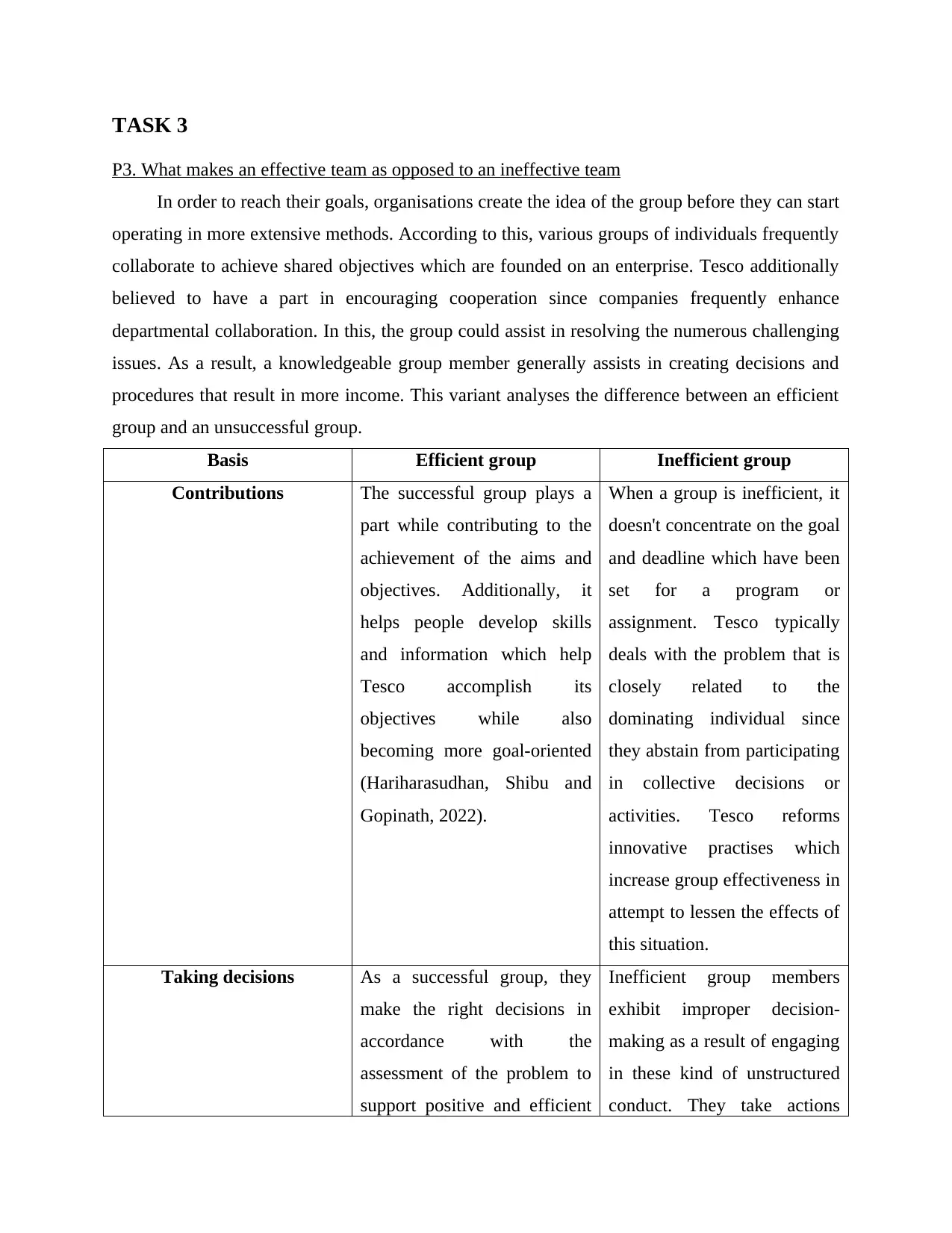
TASK 3
P3. What makes an effective team as opposed to an ineffective team
In order to reach their goals, organisations create the idea of the group before they can start
operating in more extensive methods. According to this, various groups of individuals frequently
collaborate to achieve shared objectives which are founded on an enterprise. Tesco additionally
believed to have a part in encouraging cooperation since companies frequently enhance
departmental collaboration. In this, the group could assist in resolving the numerous challenging
issues. As a result, a knowledgeable group member generally assists in creating decisions and
procedures that result in more income. This variant analyses the difference between an efficient
group and an unsuccessful group.
Basis Efficient group Inefficient group
Contributions The successful group plays a
part while contributing to the
achievement of the aims and
objectives. Additionally, it
helps people develop skills
and information which help
Tesco accomplish its
objectives while also
becoming more goal-oriented
(Hariharasudhan, Shibu and
Gopinath, 2022).
When a group is inefficient, it
doesn't concentrate on the goal
and deadline which have been
set for a program or
assignment. Tesco typically
deals with the problem that is
closely related to the
dominating individual since
they abstain from participating
in collective decisions or
activities. Tesco reforms
innovative practises which
increase group effectiveness in
attempt to lessen the effects of
this situation.
Taking decisions As a successful group, they
make the right decisions in
accordance with the
assessment of the problem to
support positive and efficient
Inefficient group members
exhibit improper decision-
making as a result of engaging
in these kind of unstructured
conduct. They take actions
P3. What makes an effective team as opposed to an ineffective team
In order to reach their goals, organisations create the idea of the group before they can start
operating in more extensive methods. According to this, various groups of individuals frequently
collaborate to achieve shared objectives which are founded on an enterprise. Tesco additionally
believed to have a part in encouraging cooperation since companies frequently enhance
departmental collaboration. In this, the group could assist in resolving the numerous challenging
issues. As a result, a knowledgeable group member generally assists in creating decisions and
procedures that result in more income. This variant analyses the difference between an efficient
group and an unsuccessful group.
Basis Efficient group Inefficient group
Contributions The successful group plays a
part while contributing to the
achievement of the aims and
objectives. Additionally, it
helps people develop skills
and information which help
Tesco accomplish its
objectives while also
becoming more goal-oriented
(Hariharasudhan, Shibu and
Gopinath, 2022).
When a group is inefficient, it
doesn't concentrate on the goal
and deadline which have been
set for a program or
assignment. Tesco typically
deals with the problem that is
closely related to the
dominating individual since
they abstain from participating
in collective decisions or
activities. Tesco reforms
innovative practises which
increase group effectiveness in
attempt to lessen the effects of
this situation.
Taking decisions As a successful group, they
make the right decisions in
accordance with the
assessment of the problem to
support positive and efficient
Inefficient group members
exhibit improper decision-
making as a result of engaging
in these kind of unstructured
conduct. They take actions
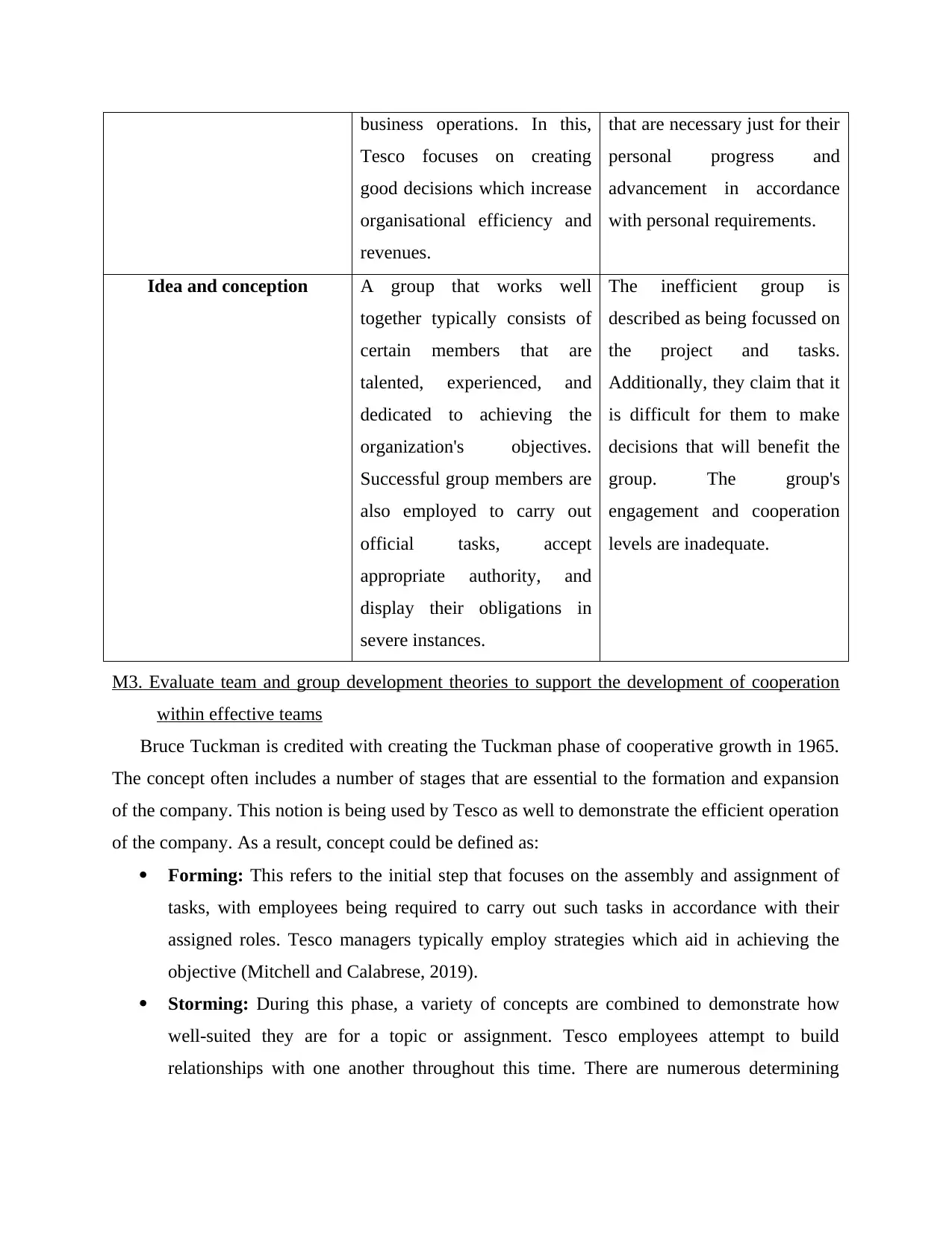
business operations. In this,
Tesco focuses on creating
good decisions which increase
organisational efficiency and
revenues.
that are necessary just for their
personal progress and
advancement in accordance
with personal requirements.
Idea and conception A group that works well
together typically consists of
certain members that are
talented, experienced, and
dedicated to achieving the
organization's objectives.
Successful group members are
also employed to carry out
official tasks, accept
appropriate authority, and
display their obligations in
severe instances.
The inefficient group is
described as being focussed on
the project and tasks.
Additionally, they claim that it
is difficult for them to make
decisions that will benefit the
group. The group's
engagement and cooperation
levels are inadequate.
M3. Evaluate team and group development theories to support the development of cooperation
within effective teams
Bruce Tuckman is credited with creating the Tuckman phase of cooperative growth in 1965.
The concept often includes a number of stages that are essential to the formation and expansion
of the company. This notion is being used by Tesco as well to demonstrate the efficient operation
of the company. As a result, concept could be defined as:
Forming: This refers to the initial step that focuses on the assembly and assignment of
tasks, with employees being required to carry out such tasks in accordance with their
assigned roles. Tesco managers typically employ strategies which aid in achieving the
objective (Mitchell and Calabrese, 2019).
Storming: During this phase, a variety of concepts are combined to demonstrate how
well-suited they are for a topic or assignment. Tesco employees attempt to build
relationships with one another throughout this time. There are numerous determining
Tesco focuses on creating
good decisions which increase
organisational efficiency and
revenues.
that are necessary just for their
personal progress and
advancement in accordance
with personal requirements.
Idea and conception A group that works well
together typically consists of
certain members that are
talented, experienced, and
dedicated to achieving the
organization's objectives.
Successful group members are
also employed to carry out
official tasks, accept
appropriate authority, and
display their obligations in
severe instances.
The inefficient group is
described as being focussed on
the project and tasks.
Additionally, they claim that it
is difficult for them to make
decisions that will benefit the
group. The group's
engagement and cooperation
levels are inadequate.
M3. Evaluate team and group development theories to support the development of cooperation
within effective teams
Bruce Tuckman is credited with creating the Tuckman phase of cooperative growth in 1965.
The concept often includes a number of stages that are essential to the formation and expansion
of the company. This notion is being used by Tesco as well to demonstrate the efficient operation
of the company. As a result, concept could be defined as:
Forming: This refers to the initial step that focuses on the assembly and assignment of
tasks, with employees being required to carry out such tasks in accordance with their
assigned roles. Tesco managers typically employ strategies which aid in achieving the
objective (Mitchell and Calabrese, 2019).
Storming: During this phase, a variety of concepts are combined to demonstrate how
well-suited they are for a topic or assignment. Tesco employees attempt to build
relationships with one another throughout this time. There are numerous determining
⊘ This is a preview!⊘
Do you want full access?
Subscribe today to unlock all pages.

Trusted by 1+ million students worldwide
1 out of 16
Related Documents
Your All-in-One AI-Powered Toolkit for Academic Success.
+13062052269
info@desklib.com
Available 24*7 on WhatsApp / Email
![[object Object]](/_next/static/media/star-bottom.7253800d.svg)
Unlock your academic potential
Copyright © 2020–2026 A2Z Services. All Rights Reserved. Developed and managed by ZUCOL.

